Bing-Chuan Wang
Decentralized Multi-agent Reinforcement Learning based State-of-Charge Balancing Strategy for Distributed Energy Storage System
Aug 29, 2023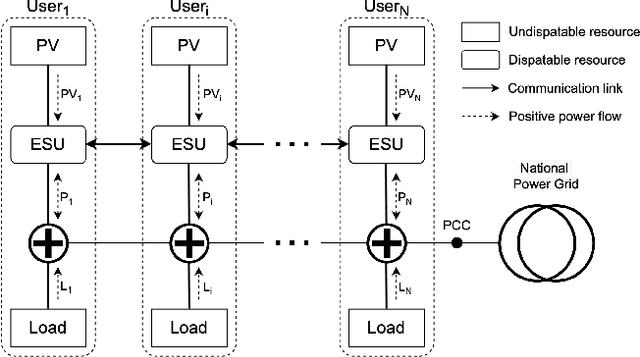
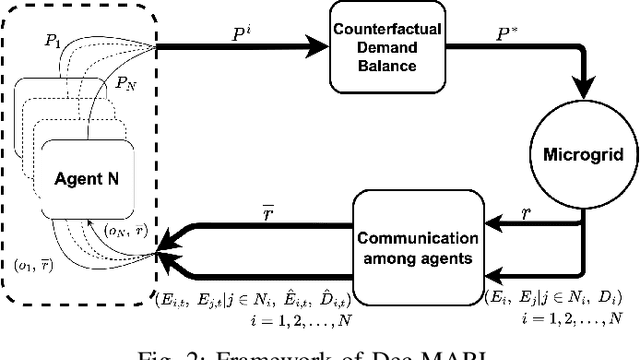
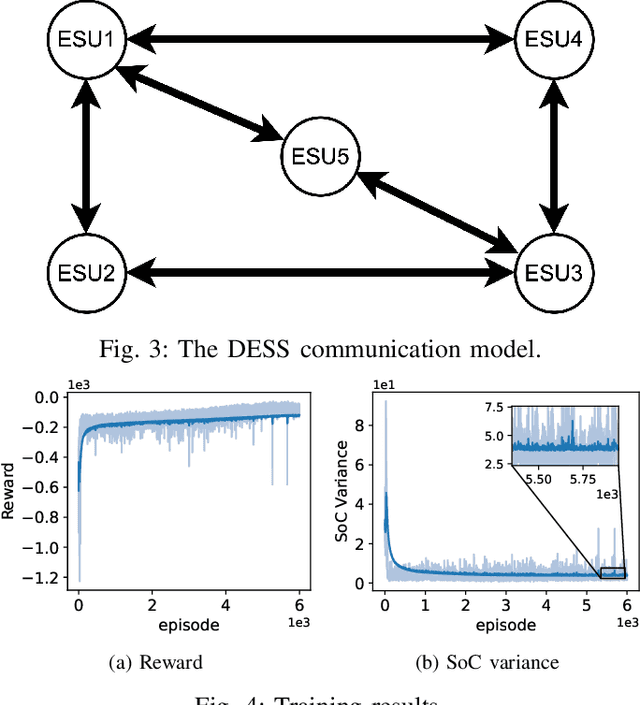
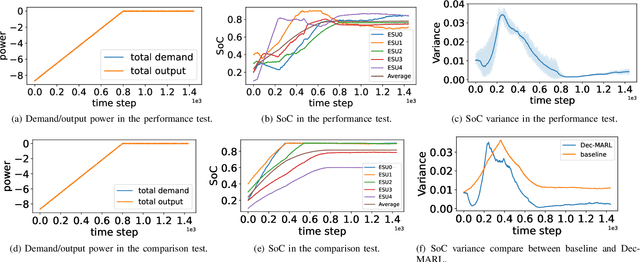
Abstract:This paper develops a Decentralized Multi-Agent Reinforcement Learning (Dec-MARL) method to solve the SoC balancing problem in the distributed energy storage system (DESS). First, the SoC balancing problem is formulated into a finite Markov decision process with action constraints derived from demand balance, which can be solved by Dec-MARL. Specifically, the first-order average consensus algorithm is utilized to expand the observations of the DESS state in a fully-decentralized way, and the initial actions (i.e., output power) are decided by the agents (i.e., energy storage units) according to these observations. In order to get the final actions in the allowable range, a counterfactual demand balance algorithm is proposed to balance the total demand and the initial actions. Next, the agents execute the final actions and get local rewards from the environment, and the DESS steps into the next state. Finally, through the first-order average consensus algorithm, the agents get the average reward and the expended observation of the next state for later training. By the above procedure, Dec-MARL reveals outstanding performance in a fully-decentralized system without any expert experience or constructing any complicated model. Besides, it is flexible and can be extended to other decentralized multi-agent systems straightforwardly. Extensive simulations have validated the effectiveness and efficiency of Dec-MARL.
ATM-R: An Adaptive Tradeoff Model with Reference Points for Constrained Multiobjective Evolutionary Optimization
Jan 09, 2023



Abstract:The goal of constrained multiobjective evolutionary optimization is to obtain a set of well-converged and welldistributed feasible solutions. To complete this goal, there should be a tradeoff among feasibility, diversity, and convergence. However, it is nontrivial to balance these three elements simultaneously by using a single tradeoff model since the importance of each element varies in different evolutionary phases. As an alternative, we adapt different tradeoff models in different phases and propose a novel algorithm called ATM-R. In the infeasible phase, ATM-R takes the tradeoff between diversity and feasibility into account, aiming to move the population toward feasible regions from diverse search directions. In the semi-feasible phase, ATM-R promotes the transition from "the tradeoff between feasibility and diversity" to "the tradeoff between diversity and convergence", which can facilitate the discovering of enough feasible regions and speed up the search for the feasible Pareto optima in succession. In the feasible phase, the tradeoff between diversity and convergence is considered to attain a set of well-converged and well-distributed feasible solutions. It is worth noting that the merits of reference points are leveraged in ATM-R to accomplish these tradeoff models. Also, in ATM-R, a multiphase mating selection strategy is developed to generate promising solutions beneficial to different evolutionary phases. Systemic experiments on a wide range of benchmark test functions demonstrate that ATM-R is effective and competitive, compared against five state-of-the-art constrained multiobjective optimization evolutionary algorithms.
A unified framework of epidemic spreading prediction by empirical mode decomposition based ensemble learning techniques
Jan 07, 2019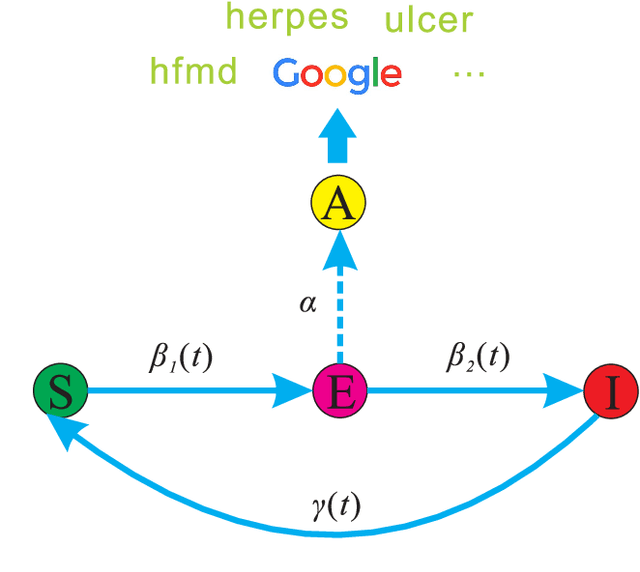
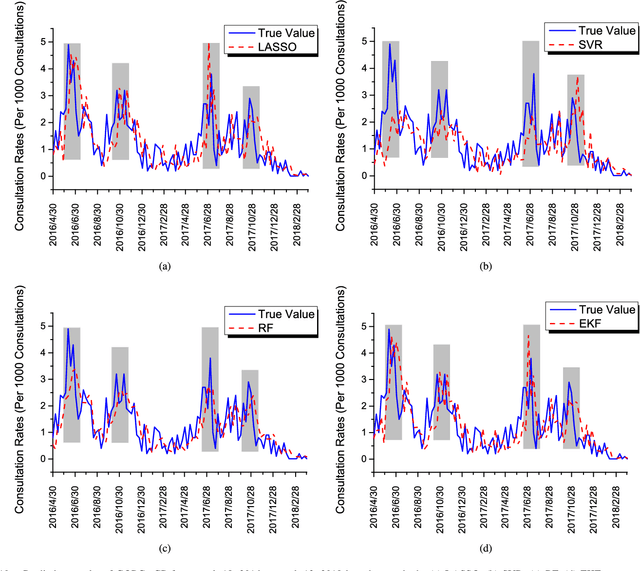
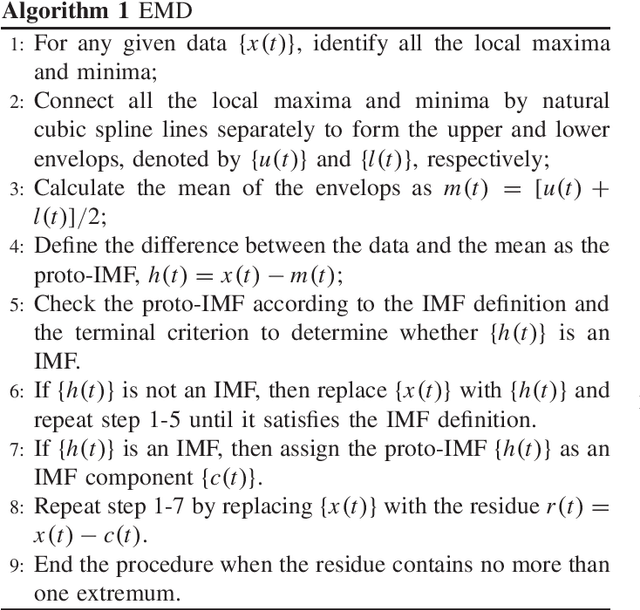

Abstract:In this paper, a unified susceptible-exposed-infected-susceptible-aware (SEIS-A) framework is proposed to combine epidemic spreading with individuals' on-line self-consultation behaviors. An epidemic spreading prediction model is established based on the SEIS-A framework. The prediction process contains two phases. In phase I, the time series data of disease density are decomposed through the empirical mode decomposition (EMD) method to obtain the intrinsic mode functions (IMFs). In phase II, the ensemble learning techniques which use the on-line query data as an additional input are applied to these IMFs. Finally, experiments for prediction of weekly consultation rates of Hand-foot-and-mouth disease (HFMD) in Hong Kong are conducted to validate the effectiveness of the proposed method. The main advantage of this method is that it outperforms other methods on fluctuating complex data.
A Constrained Cooperative Coevolution Strategy for Weights Adaptation Optimization of Heterogeneous Epidemic Spreading Networks
Jan 03, 2019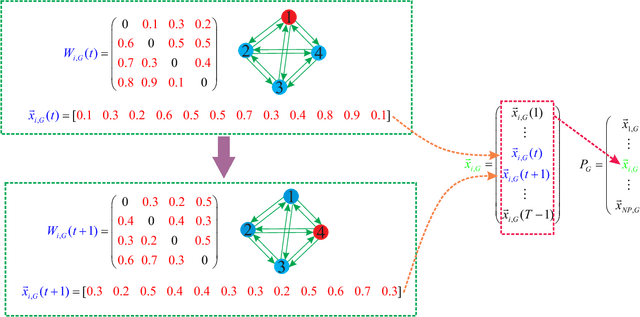
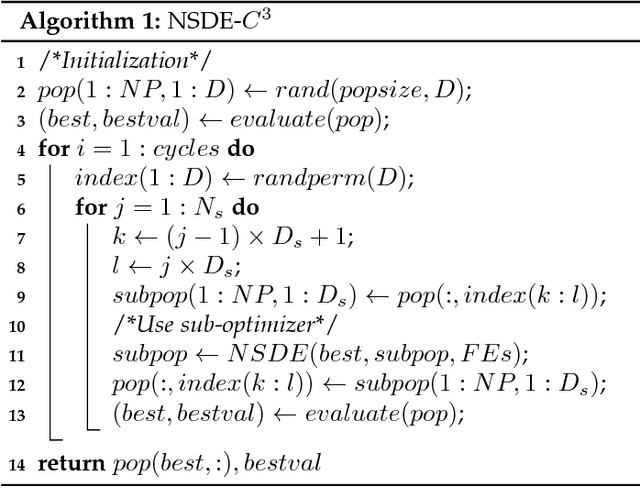
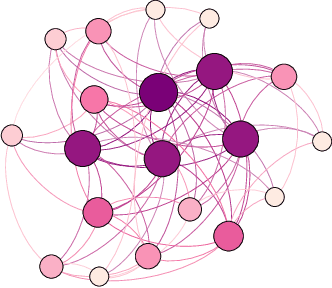

Abstract:In this paper, the dynamic constrained optimization problem of weights adaptation for heterogeneous epidemic spreading networks is investigated. Due to the powerful ability of searching global optimum, evolutionary algorithms are employed as the optimizers. One major difficulty following is that the dimension of the weights adaptation optimization problem is increasing exponentially with the network size and most existing evolutionary algorithms cannot achieve satisfied performance on large-scale optimization problems. To address this issue, a novel constrained cooperative coevolution ($C^3$) strategy which can separate the original large-scale problem into different subcomponents is tailored for this problem. Meanwhile, the $\epsilon$ constraint-handling technique is employed to achieve the tradeoff between constraint and objective function. To validate the effectiveness of the proposed method, some numerical simulations are conducted on a B\' arabasi-Albert network.
 Add to Chrome
Add to Chrome Add to Firefox
Add to Firefox Add to Edge
Add to Edge